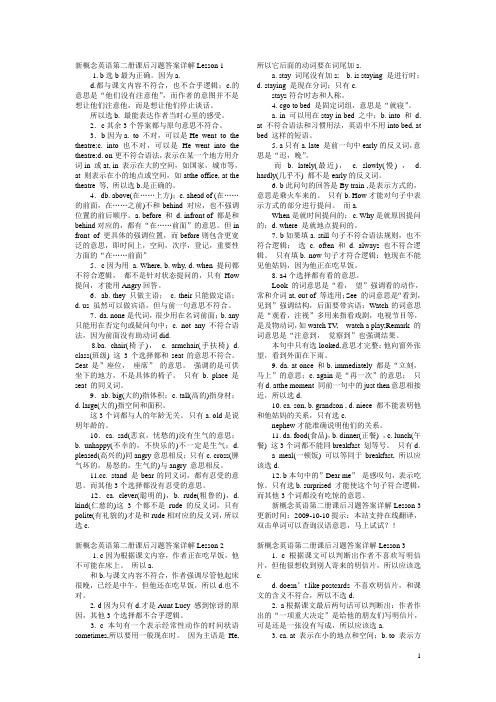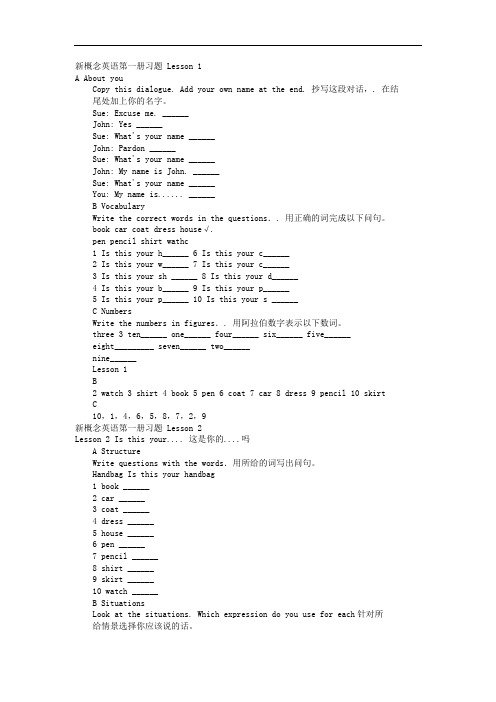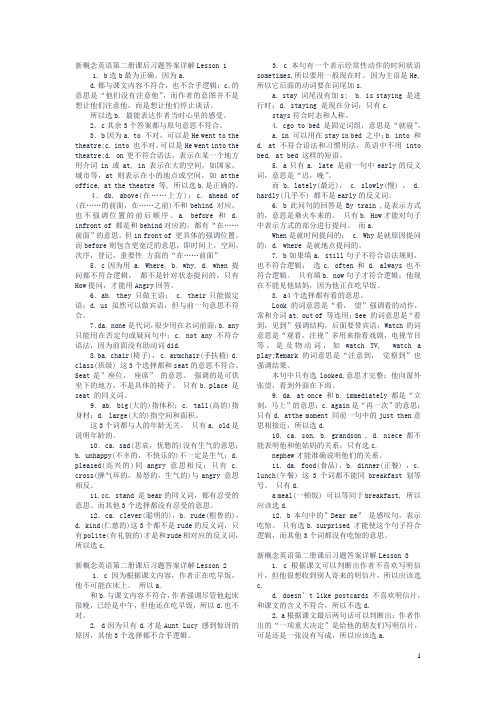新概念英语习题答案
新概念英语练习题及答案

新概念英语练习题及答案1. 根据所给的英文句子,选择正确的中文翻译。
A. The weather is very hot today.a) 今天天气很热。
b) 今天天气很冷。
c) 今天天气很潮湿。
d) 今天天气很晴朗。
2. 将下列中文句子翻译成英文。
A. 他昨天去了图书馆。
B. 她正在读一本有趣的书。
C. 他们计划下周去旅行。
3. 用所给的单词填空,使句子完整。
A. I (have/has) a new bicycle.B. She (like/likes) to play tennis.C. They (is/are) going to the park tomorrow.4. 阅读下面的短文,然后回答问题。
It was a sunny day. Tom and his sister, Lucy, went to the park. They played on the swings and had a picnic. In the afternoon, they went home and watched a movie.A. What did Tom and Lucy do in the morning?B. Where did they go in the afternoon?5. 根据所给的英文对话,选择正确的回答。
Tom: What time is it now?Lucy: It's half past three.A. It's 3:00.B. It's 3:30.C. It's 3:45.D. It's 4:00.6. 选择正确的单词填空,完成句子。
A. The (cat/dog) is sleeping on the sofa.B. She (buys/bought) a new dress yesterday.C. They (are/were) at the party last night.7. 根据所给的英文句子,选择正确的中文翻译。
新概念英语练习题及答案

新概念英语练习题及答案一、词汇练习1. 根据中文提示,写出下列单词的英文形式。
- 旅行者:traveller- 邀请:invitation- 决定:decision- 困难:difficulty- 问题:problem2. 根据英文提示,写出下列单词的中文意思。
- Discuss - 讨论- Experience - 经历- Opportunity - 机会- Suggest - 建议- Achieve - 实现二、语法练习1. 将下列句子改为一般疑问句,并回答。
- I am a student.- You are reading a book.- He is going to the cinema.2. 将下列句子改为否定句。
- She can speak English.- We have finished our homework.- They are playing football.三、阅读理解阅读以下短文,并回答下列问题。
Tom is a young man who loves to travel. He has been to many places around the world and has many interesting stories to tell. Last summer, he went to Paris and visited the Eiffel Tower. He also went to London and saw the Big Ben. This year, he plans to go to Australia and see the Sydney Opera House. He is very excited about his upcoming trip.1. Where did Tom visit last summer?2. What is Tom planning to do this year?3. What does Tom love to do?四、完形填空阅读下面的短文,从括号内选出合适的选项填入空白处。
新概念英语第二册课后习题答案详解

新概念英语第二册课后习题答案详解Lesson 11. b选b最为正确。
因为a.d.都与课文内容不符合,也不合乎逻辑;c.的意思是“他们没有注意他”,而作者的意图并不是想让他们注意他,而是想让他们停止谈话。
所以选b. 最能表达作者当时心里的感受。
2.c其余3个答案都与原句意思不符合。
3.b因为a. to 不对,可以是He went to the theatre;c. into 也不对,可以是He went into the theatre;d. on更不符合语法,表示在某一个地方用介词in 或at, in 表示在大的空间,如国家,城市等,at 则表示在小的地点或空间,如atthe office, at the theatre 等, 所以选b.是正确的。
4.db. above(在……上方);c. ahead of (在……的前面,在……之前)不和behind 对应,也不强调位置的前后顺序。
a. before 和d. infront of 都是和behind对应的,都有“在……前面”的意思。
但in front of 更具体的强调位置,而before则包含更宽泛的意思,即时间上,空间,次序,登记,重要性方面的“在……前面”5.c因为用 a. Where, b. why, d. when 提问都不符合逻辑,都不是针对状态提问的,只有How 提问,才能用Angry回答。
6.ab. they 只做主语; c. their只能做定语;d. us 虽然可以做宾语,但与前一句意思不符合。
7.da. none是代词,很少用在名词前面;b. any 只能用在否定句或疑问句中;c. not any 不符合语法,因为前面没有助动词did.8.ba. chair(椅子), c. armchair(手扶椅) d. class(班级) 这3个选择都和seat的意思不符合。
Seat是”座位,座席”的意思。
强调的是可供坐下的地方,不是具体的椅子。
新概念英语第二册课后习题答案详解_1-40

新概念英语第二册课后习题答案详解Lesson 11. b选b最为正确。
因为a.d.都与课文内容不符合,也不合乎逻辑;c.的意思是“他们没有注意他”,而作者的意图并不是想让他们注意他,而是想让他们停止谈话。
所以选b. 最能表达作者当时心里的感受。
2.c其余3个答案都与原句意思不符合。
3.b因为a. to 不对,可以是He went to the theatre;c. into 也不对,可以是He went into the theatre;d. on更不符合语法,表示在某一个地方用介词in 或at, in 表示在大的空间,如国家,城市等,at 则表示在小的地点或空间,如atthe office, at the theatre 等, 所以选b.是正确的。
4.db. above(在……上方);c. ahead of (在……的前面,在……之前)不和behind 对应,也不强调位置的前后顺序。
a. before 和 d. infront of 都是和behind对应的,都有“在……前面”的意思。
但in front of 更具体的强调位置,而before则包含更宽泛的意思,即时间上,空间,次序,登记,重要性方面的“在……前面”5.c因为用a. Where, b. why, d. when 提问都不符合逻辑,都不是针对状态提问的,只有How提问,才能用Angry回答。
6.ab. they 只做主语;c. their只能做定语;d. us 虽然可以做宾语,但与前一句意思不符合。
7.da. none是代词,很少用在名词前面;b. any 只能用在否定句或疑问句中;c. not any 不符合语法,因为前面没有助动词did.8.ba. chair(椅子),c. armchair(手扶椅) d. class(班级) 这3个选择都和seat的意思不符合。
Seat是”座位,座席”的意思。
强调的是可供坐下的地方,不是具体的椅子。
新概念英语第二册课后习题答案全

新概念英语第二册课后习题答案全一、练习册第1课至第10课课后习题答案1. Lesson 1: A Private ConversationAnswer Key:1. Yes, he did.2. He asked the woman to change her seat.3. She replied that she was in the middle.2. Lesson 2: Breakfast or Lunch?Answer Key:1. He wanted to buy a newspaper.2. He ordered breakfast.3. He thought it was too early for lunch.3. Lesson 3: Please Send Me a CardAnswer Key:1. He was in a small village.2. He sent a telegram to his wife.3. He was in a hospital.4. Lesson 4: An Exciting TripAnswer Key:1. They were in a bus.2. They were going to a village.3. They had a wonderful trip.5. Lesson 5: No Wrong Numbers1. He was waiting for a phone call.2. He was waiting for his uncle.3. He received a wrong number.6. Lesson 6: Percy ButtonsAnswer Key:1. He was an old man.2. He collected old coins.3. He had a valuable coin.7. Lesson 7: Too LateAnswer Key:1. They were late for the meeting.2. They missed the train.3. They had to take a taxi.8. Lesson 8: The Best and the WorstAnswer Key:1. He was a good swimmer.2. He was the best swimmer in the pool.3. He was the worst swimmer in the pool. Answer Key:1. He was a famous actor.2. He was in a small town.3. He was recognized a young man.10. Lesson 10: Not for Jazz1. He was a famous musician.2. He played the piano.3. He was not for jazz.二、练习册第11课至第20课课后习题答案11. Lesson 11: One Good Turn Deserves Another Answer Key:1. He helped an old lady.2. She helped him find his way.3. He was grateful to her.12. Lesson 12: Ask Me No QuestionsAnswer Key:1. He was a writer.2. He wrote a book about his adventures.3. He was very modest.13. Lesson 13: Going on HolidayAnswer Key:1. They were going on holiday.2. They were going to the seaside.3. They had a wonderful time.14. Lesson 14: Do You Speak English?Answer Key:1. He was a tourist.2. He was in a foreign country.3. He spoke English.15. Lesson 15: Good NewsAnswer Key:1. He was a doctor.2. He had good news for his patient.3. The patient was cured.16. Lesson 16: A Polite RequestAnswer Key:1. He was a customer.2. He wanted to buy a new car.3. He asked the salesman for help.17. Lesson 17: Across the ChannelAnswer Key:1. He was a swimmer.2. He swam across the English Channel.3. He was very tired.18. Lesson 18: Once a WeekAnswer Key:1. He was a doctor.2. He visited his patients once a week.3. He was very busy.19. Lesson 19: Sold OutAnswer Key:1. He was a customer.2. He wanted to buy a ticket.3. The ticket was sold out.20. Lesson 20: One Man in a BoatAnswer Key:1. He was a fisherman.2. He was alone in a boat.3. He caught a lot of fish.。
第一册新概念课后习题答案

新概念英语第一册习题 Lesson 1A About youCopy this dialogue. Add your own name at the end. 抄写这段对话,. 在结尾处加上你的名字。
Sue: Excuse me. ______John: Yes ______Sue: What's your name ______John: Pardon ______Sue: What's your name ______John: My name is John. ______Sue: What's your name ______You: My name is...... ______B VocabularyWrite the correct words in the questions.. 用正确的词完成以下问句。
book car coat dress house√.pen pencil shirt wathc1 Is this your h______ 6 Is this your c______2 Is this your w______ 7 Is this your c______3 Is this your sh ______ 8 Is this your d______4 Is this your b______ 9 Is this your p______5 Is this your p______ 10 Is this your s ______C NumbersWrite the numbers in figures.. 用阿拉伯数字表示以下数词。
three 3 ten______ one______ four______ six______ five______eight_________ seven______ two______nine______Lesson 1B2 watch3 shirt4 book5 pen6 coat7 car8 dress9 pencil 10 skirtC10,1,4,6,5,8,7,2,9新概念英语第一册习题 Lesson 2Lesson 2 Is this your.... 这是你的....吗A StructureWrite questions with the words.用所给的词写出问句。
新概念英语第二册全册课后习题答案详解及单元测试答案

新概念英语第二册课后习题答案详解Lesson 11. b选b最为正确。
因为a.d.都与课文内容不符合,也不合乎逻辑;c.的意思是“他们没有注意他”,而作者的意图并不是想让他们注意他,而是想让他们停止谈话。
所以选b. 最能表达作者当时心里的感受。
2.c其余3个答案都与原句意思不符合。
3.b因为a. to 不对,可以是He went to the theatre;c. into 也不对,可以是He went into the theatre;d. on更不符合语法,表示在某一个地方用介词in 或at, in 表示在大的空间,如国家,城市等,at 则表示在小的地点或空间,如atthe office, at the theatre 等, 所以选b.是正确的。
4.db. above(在……上方);c. ahead of (在……的前面,在……之前)不和behind 对应,也不强调位置的前后顺序。
a. before 和 d. infront of 都是和behind对应的,都有“在……前面”的意思。
但in front of 更具体的强调位置,而before则包含更宽泛的意思,即时间上,空间,次序,登记,重要性方面的“在……前面”5.c因为用 a. Where, b. why, d. when 提问都不符合逻辑,都不是针对状态提问的,只有How提问,才能用Angry回答。
6.ab. they 只做主语; c. their只能做定语;d. us 虽然可以做宾语,但与前一句意思不符合。
7.da. none是代词,很少用在名词前面;b. any 只能用在否定句或疑问句中;c. not any 不符合语法,因为前面没有助动词did.8.ba. chair(椅子), c. armchair(手扶椅) d. class(班级) 这3个选择都和seat的意思不符合。
Seat是”座位,座席”的意思。
强调的是可供坐下的地方,不是具体的椅子。
新概念1练习题答案

新概念1练习题答案新概念英语第一册是一套非常受欢迎的英语初级学习教材,它通过各种练习来帮助学生巩固所学知识。
以下是一些新概念英语第一册练习题的答案,供学习者参考。
练习1:词汇练习1. 请根据上下文,用正确的形式填空。
- The cat is sitting on the mat.- She is reading a book.- We are going to the cinema tonight.2. 请将下列单词转换为复数形式。
- box → boxes- child → children- foot → feet3. 请将下列单词转换为动词的现在分词形式。
- run → running- swim → swimming- eat → eating练习2:语法练习1. 请用正确的时态填空。
- I have been to Paris twice.- He is (not) working this weekend.- They were at the party last night.2. 请用正确的形式完成下列句子。
- If it rains tomorrow, we will stay at home.- When she finishes her homework, she will go to the library.3. 请将下列句子变为否定句。
- He is not going to the concert.- They were not at the beach yesterday.练习3:听力练习听录音,根据所听到的内容回答问题。
1. What is the weather like today?- The weather is sunny.2. Where are the children?- The children are in the garden.3. What is the man doing?- The man is cooking dinner.练习4:口语练习以下为一些口语练习的示例对话,学习者可以与伙伴一起练习。
- 1、下载文档前请自行甄别文档内容的完整性,平台不提供额外的编辑、内容补充、找答案等附加服务。
- 2、"仅部分预览"的文档,不可在线预览部分如存在完整性等问题,可反馈申请退款(可完整预览的文档不适用该条件!)。
- 3、如文档侵犯您的权益,请联系客服反馈,我们会尽快为您处理(人工客服工作时间:9:00-18:30)。
新概念英语习题答案【篇一:新概念英语课后答案】. b选b最为正确。
因为a. d.都与课文内容不符合,也不合乎逻辑;c.的意思是“他们没有注意他”,而作者的意图并不是想让他们注意他,而是想让他们停止谈话。
所以选b. 最能表达作者当时心里的感受。
2.c其余3个答案都与原句意思不符合。
3.b因为a. to 不对,可以是he went to the theatre;c. into 也不对,可以是he went into the theatre;d. on更不符合语法,表示在某一个地方用介词in 或at, in 表示在大的空间,如国家,城市等,at 则表示在小的地点或空间,如atthe office, at the theatre 等, 所以选b.是正确的。
4.db. above(在……上方);c. ahead of (在……的前面,在……之前)不和behind 对应,也不强调位置的前后顺序。
a. before 和 d. in front of 都是和behind对应的,都有“在……前面”的意思。
但in front of 更具体的强调位置,而before 则包含更宽泛的意思,即时间上,空间,次序,登记,重要性方面的“在……前面”5.c因为用 a. where, b. why, d. when 提问都不符合逻辑,都不是针对状态提问的,只有how提问,才能用angry回答。
6.ab. they 只做主语;c. their只能做定语;d. us 虽然可以做宾语,但与前一句意思不符合。
7.da. none是代词,很少用在名词前面;b. any 只能用在否定句或疑问句中;c. not any 不符合语法,因为前面没有助动词did.8.ba. chair(椅子), c. armchair(手扶椅) d. class(班级) 这3个选择都和seat的意思不符合。
seat 是”座位,座席” 的意思。
强调的是可供坐下的地方,不是具体的椅子。
只有b. place 是seat 的同义词。
9.ab. big(大的)指体积;c. tall(高的)指身材;d. large(大的)指空间和面积。
这3个词都与人的年龄无关。
只有a. old是说明年龄的。
10.ca. sad(悲哀,忧愁的)没有生气的意思;b. unhappy(不幸的,不快乐的)不一定是生气;d. pleased(高兴的)同angry意思相反;只有c. cross(脾气坏的,易怒的,生气的)与angry 意思相反。
11.cc. stand 是bear的同义词,都有忍受的意思。
而其他3个选择都没有忍受的意思。
12.ca. clever(聪明的),b. rude(粗鲁的),d. kind(仁慈的) 这3个都不是rude的反义词,只有polite(有礼貌的)才是和rude相对应的反义词,所以选c.lesson 21. c因为根据课文内容,作者正在吃早饭,他不可能在床上。
所以a. 和b.与课文内容不符合,作者强调尽管他起床很晚,已经是中午,但他还在吃早饭,所以d.也不对。
2. d因为只有d.才是aunt lucy 感到惊讶的原因,其他3个选择都不合乎逻辑。
3. c本句有一个表示经常性动作的时间状语sometimes,所以要用一般现在时。
因为主语是he, 所以它后面的动词要在词尾加s.a. stay 词尾没有加s;b. is staying 是进行时;d. staying 是现在分词;只有c. stays符合时态和人称。
4. cgo to bed 是固定词组,意思是“就寝”。
a. in 可以用在stay in bed 之中;b. into 和 d. at 不符合语法和习惯用法,英语中不用into bed, at bed 这样的短语。
5. a只有a. late 是前一句中early的反义词,意思是“迟,晚”。
而 b. lately(最近), c. slowly(慢) , d. hardly(几乎不) 都不是early的反义词。
6. b此问句的回答是by train ,是表示方式的,意思是乘火车来的。
只有b. how才能对句子中表示方式的部分进行提问。
而a. when是就时间提问的; c. why是就原因提问的;d. where 是就地点提问的。
7. b如果填a. still句子不符合语法规则,也不符合逻辑;选c. often 和d. always 也不符合逻辑。
只有填b. now 句子才符合逻辑:他现在不能见他姑妈,因为他正在吃早饭。
8. a4个选择都有看的意思。
look 的词意思是“看,望”强调看的动作,常和介词at, out of 等连用;see 的词意思是“看到,见到”强调结构,后面要带宾语;watch的词意思是“观看,注视”多用来指看戏剧,电视节目等,是及物动词,如watch tv, watch a play;remark 的词意思是“注意到,觉察到”也强调结果。
本句中只有选looked,意思才完整:他向窗外张望,看到外面在下雨。
9. da. at once 和b. immediately 都是“立刻,马上”的意思;c. again 是“再一次”的意思;只有d. at the moment 同前一句中的just then意思相接近,所以选d.10. ca. son,b. grandson , d. niece 都不能表明他和他姑妈的关系,只有选c. nephew才能准确说明他们的关系。
11. da. food(食品),b. dinner(正餐) ,c. lunch(午餐) 这3个词都不能同breakfast 划等号。
只有d. a meal(一顿饭) 可以等同于breakfast, 所以应该选d.12. b本句中的”dear me” 是感叹句,表示吃惊。
只有选b. surprised 才能使这个句子符合逻辑,而其他3个词都没有吃惊的意思。
lesson 31. c根据课文可以判断出作者不喜欢写明信片,但他很想收到别人寄来的明信片,所以应该选c.d. doesn?t like postcards 不喜欢明信片,和课文的含义不符合,所以不选d.2. a根据课文最后两句话可以判断出:作者作出的“一项重大决定”是给他的朋友们写明信片,可是还是一张没有写成,所以应该选a.3. ca. at 表示在小的地点和空间;b. to 表示方向;d. on 表示在……上;只有c. in 表示在大的空间和地方,如城市国家等,所以选c.4. a只有选a. who taught ,这句问话才与回答相配。
5. d只有选d. in a friendly way(以友好的方式)才能说明前一句he wasa friendly waiter,也合乎语法和逻辑。
而其他3个 a. friend(朋友),b. as friends(作为朋友),c. like friends(像朋友一样)在语法上都讲不通。
6. b本句的时态是一般过去时,应该用动词的过去式形式;a. reads 是第3人称蛋单数现在时形式;c. red 词意思不符合;d. reading 是现在分词形式;b. read 过去式和现在式形式相同,发音不同。
所以只有选b.7. ca. the hole 词意思不对;b. the ball 和 d. all of 不合乎习惯用法;英语中不用the all day, all of day 这样一来的短语。
只有选c. all 才能使句中的词组all day 同前一句中的the whole day 意思相同。
8. c句中的waiter 是“饭店服务员”的意思,他通常在饭店工作,而不在a. public garden(公园),b. shop(商店),d. private house(私宅) 工作,所以选c. restaurant.9. b只有b. borrowed 才与前一句中的lent相对应,而其他3个选择都不是。
英语中的borrow 和lend 都有“借”的意思,但是borrow是“向……借”,而lend则是借给。
10. ab. end(最后,结束)有名词和动词词性,不能用在名词前修饰名词。
c. latest (最近的)不符合意思。
d. bottom(底部)是名词,不能修饰名词只有a. final(最后的)才能使句子的意思成立。
11. b只有b. made up his mind(下决心)才同前一句中的made a big decision 意思相近。
而其他3个选择 a. thought about it (考虑),c. changed his mind(改变主意),d. made a wish(立下心愿)都没有下决心的意思。
12. b只有b. didn?t write even one(连一张也没有写)与前一句中的didn?t write a single card 意思相同,而a. wrote only one, c. wrote just one, d. wrote all the cards except one 都与其意思有别。
lesson 41. d根据课文内容tim is an engineer. he is working for a big firm..., 只有d. tim is working for a big firm as an engineer 是对的,其他3个与文章不符合。
2. b根据课文的最后一句my brother has never been abroad before…,应该选b.其他3个选择都与课文内容不符合。
3. ab. in(在……里面)不能和动词go连用;c. at(在……地方)也不能同go 连用;d. into(进入……内)可以与go连用,但是到某个国家不能用go into;只有a. to 同动词go 连用 go to 才能表示到某个地方去,如国家,城市等,所以选a.4. b本句是问“他在那儿呆了多久”。
因为说话时他还在那,所以应该用现在完成时态。
a. is he 是一般现在时;c. has he 中没有过去分词been, 不符合语法;d. was he 是一般过去时;只有b. has he been 是现在完成时, 所以选b.5. ba. for 只有同表示一段时间的词连用时候才能用在完成时中,如for six months, for one year等.c. from 常与介词to连用表示从……到……,它很少用于现在完成时;d. by 可以表示时间“到……为止”,常用于过去完成时中和将来完成时中,但是它用在本句意思不对;只有b. since(从……以来)可以用在完成时态中,选b.才能使句子的时态和意思正确并且合乎逻辑。
